
When it comes down to simple biology, genders differ. Some differences make sense and some make you wonder.
One of the strange differences between men and women is that women tend to be at a higher risk for developing vision problems.
In fact, women aren’t just a little more likely to experience eye issues, they are nearly twice as likely as men to develop eye health issues.
You might ask yourself how that can be possible? How can the health of your eyes differ just based on gender? It’s a question deserving of a deeper dive.
Women’s eye health is not just an age issue
For years, researchers have provided a simple explanation for this phenomenon: women live longer than men. Since women live longer, they tend to have more eye issues. While it’s true women live an average of three years longer, there are a number of other, more significant, factors contributing to the vision issues experienced by women.
In fact, the National Eye Institute estimates women account for roughly 65% of the nearly 3.5 million visual impairments occurring in Americans over the age of 40. The majority of these eye health issues are conditions resulting from cataracts and age-related macular degeneration.
While age certainly plays a role in eye health and vision issues, hormones, medication, and other health conditions appear to have a more serious impact on women’s vision than originally thought.
How hormones factor-in
Women and men generally have the same types of hormones but in different amounts. Over the course of a woman’s life, changes that come with puberty, having children, and menopause result in tremendous fluctuations in the amount of estrogen in a woman’s body. In addition, many women use—or have used—birth control pills, which also tend to cause large swings in levels of both estrogen and progesterone.

Over time, these ever-changing hormone levels have a significant influence on vision and eye health. For many women, this can result in blurred vision and dry eye syndrome. Left untreated, these conditions can lead to more serious, and even permanent damage to vision.
Medications matter
Birth control pills aren’t the only prescription medication affecting women’s long-term eye health. As a general rule, women take more prescription and over-the-counter medications than men do. Women also take these medications for long periods of time than men.
Unfortunately, many of these medications, including antihistamines, antibiotics, anti-inflammatory medications, and medications that treat anxiety and depression, appear to contribute to vision problems.

Some medications, including antihistamines, cause temporary irritation and dry eyes, while others such as antibiotics and cholesterol medications, can cause double vision, floaters, sensitivity to light, and contribute to more serious issues including cataracts and glaucoma.
Considering the potential side effects caused by over-the-counter and prescription medications, before taking the medication, it’s important for women to consult with their doctor and specifically ask about any potential eye health issues
Autoimmune disease is a factor
Nearly all eye health issues stem from some form of an autoimmune disease. An autoimmune disease causes your immune system to mistakenly attack and damage the healthy tissue of your body. While research has yet to determine exactly why autoimmune condition occur, it’s clear they have a serious effect on eye health.
In addition, over 75% of those diagnosed with an autoimmune disease, including lupus, multiple sclerosis, psoriasis, rheumatoid arthritis, diabetes, and thyroid disorders, are women.
The primary vision issues resulting from an autoimmune disease tend to be dry eye syndrome, scleritis (inflammation of the white part of the eye), sensitivity to light, floaters, cataracts, and glaucoma.
Protecting women’s vision
As you have learned, while age plays a role in the difference between the health of women’s and men’s eyes, it’s not the only thing that matters.
There are many steps women can take to support healthy eyes, including eating a diet rich in eye-friendly vitamins, minerals, and nutrients (Vitamin A, C, E, zinc, and omega-3 fatty acids), not smoking, and protecting the eyes when out in the sun.
However, nothing is more important for women to protect the long-term health of their eyes than early-detection and treatment.
Unfortunately, it appears that just over 25% of women have had an eye exam in the last two years. Early detection can only occur through regular annual visits for an eye exam. If you haven’t had your eyes examined by your optometrist in the last year, it’s time to take the first and most important step to protect your vision and the long-term health of your eyes.

